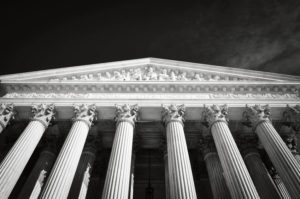SCOTUS Will Hear a Collection of Humanist Issues

You have read a lot in these pages over the past months about the recent decision by the Supreme Court of the United States that ruled—incorrectly, we believe—that a towering cross can stand on public land in Bladensburg, Maryland and be maintained with taxpayer funds. The decision was one of the last handed down by justices in the 2018-2019 term.
So what humanist issues are in the high court’s pipeline for the 2019-2020 term? They include cases that address government support of religious education and employment discrimination against LGBTQ people. Court-watchers also expect some of the anti-choice laws recently enacted by state legislatures to make their way on to the docket.
One case that has already been scheduled for the October term is Espinoza v. Montana Department of Revenue, which directly addresses an important aspect of the separation of church and state: whether states can prohibit government funds for education from being used at religious schools. The plaintiffs in the case—three low-income, single mothers—are challenging a Montana law prohibiting certain state-supported scholarship funds from being used to pay tuition at religious schools.
The plaintiffs are represented by the Institute for Justice (IJ), an organization whose top issue is “educational choice”. To IJ, educational choice means that parents should have the right to use tax dollars (either directly or in the form of tax credits) to send their children to religious schools. In the upcoming term, nine justices will tell us whether or not their definition is constitutional.
Another humanist issue that features in several cases this year is that of employment discrimination against the LGBTQ community. Three cases are slated to be heard in the upcoming term; all rest on whether Title VII of the Civil Rights Act of 1964 covers LGBTQ people when it prohibits employment discrimination “because of…sex”.
One of these cases, R.G. & G.R. Harris Funeral Homes Inc. v. Equal Employment Opportunity Commission, overtly puts religion front-and-center. The case involves an interpretation of the protections of Title VII with regard to a transgender woman. Aimee Stephens was fired from her position as a funeral director at Harris Funeral Homes after notifying her employers that she would be transitioning.
According to court documents, the owner of the funeral home fired her shortly after because she was violating the dress code and had begun using the bathroom with other female staff and clients. The owner further stated that,
because Rost [the owner] interprets the Bible as teaching that sex is immutable, he believed that he “would be violating God’s commands” if a male [sic] representative of Harris Homes presented himself [sic] as a woman while representing the company…. Were he forced to violate his faith that way, Rost “would feel significant pressure to sell [the] business and give up [his] life’s calling of ministering to grieving people as a funeral home director and owner.”
The petitioner, Harris Funeral Homes, holds that the word “sex” in Title VII refers to “a person’s status as male or female as objectively determined by anatomical and physiological factors, particularly those involved in reproduction” but not to gender identity. The EEOC, in support of Stephens, maintains that Title VII protects her from employment discrimination. Harris Funeral Homes is being represented by Alliance Defending Freedom, an organization whose mission is “to keep the doors open for the Gospel by advocating for religious liberty, the sanctity of life, and marriage and family.”
SCOTUS consolidated the other two cases that will be heard on the subject of Title VII, Altitude Express v. Zarda and Bostock v. Clayton County, given that plaintiffs in both cases claim that they were fired from their jobs because of their sexual orientation, a violation of their civil rights that they argue is prohibited by Title VII.
Yet to be added to the SCOTUS docket are the reproductive rights issues that have been raised by draconian laws passed in recent months by states including Georgia, Ohio, Missouri and Alabama, and others. Each of these laws prohibits all or most abortions performed in some cases with strict time constraints—from any time after a woman knows she is pregnant (Alabama) to six or eight weeks later (Ohio and Missouri respectively). Many of these laws allow no exceptions for rape or incest.
In fact, more than 90 laws restricting abortion access and reproductive rights passed various state legislatures so far in 2019, according to the National Institute for Reproductive Health. Several of these are bound to end up in front of the US Supreme Court in the next term. Our team at the Appignani Humanist Legal Center will remain focused on the separation of church and state and will be weighing in on these cases as they come before the court. Stay tuned.
